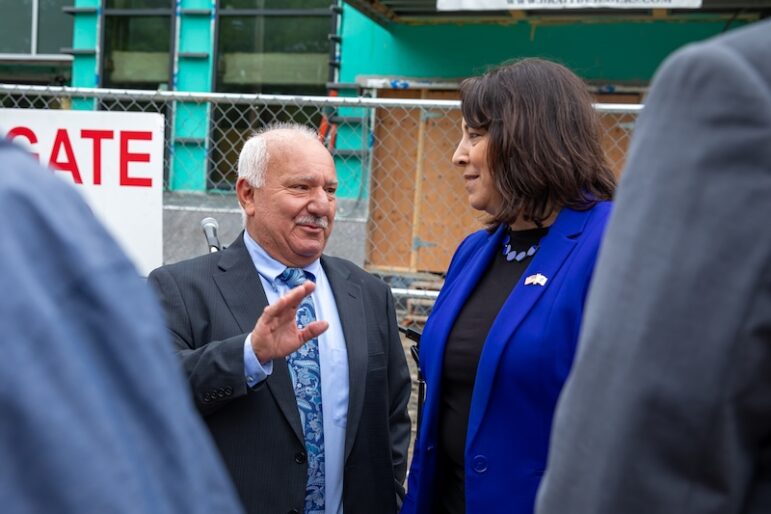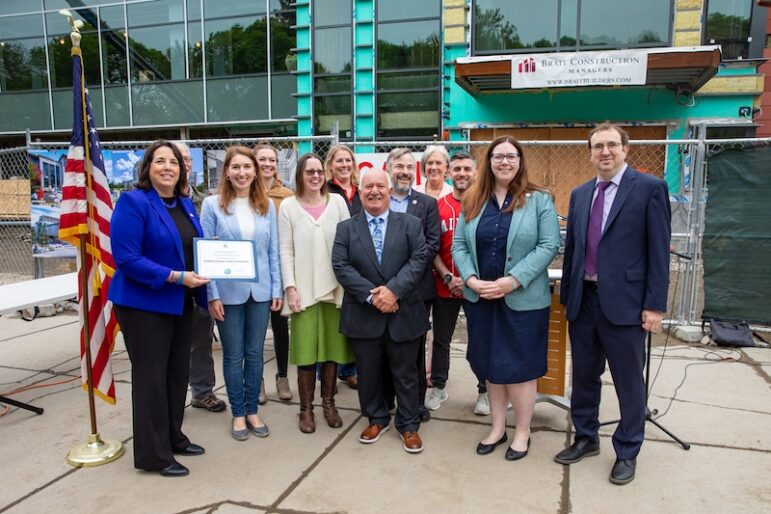
Watertown’s efforts to promote energy efficiency and reduce greenhouse gases were recognized by the State on Friday. The Healey-Driscoll Administration held the celebration of the state’s first 19 certified Climate Leader Communities outside the “crown jewel” of Watertown’s green efforts: the net-zero energy high school now being constructed on Columbia Avenue.
The Climate Leader Communities program encourages municipalities to lower municipal emissions, maximize the efficiency of buildings and transportation, and slash energy costs. CLC certified communities can apply for grants of up to $1.15 million for projects that reduce municipal emissions. Lt. Gov. Kim Driscoll joined the celebration for the first 19 certified communities.
“I know firsthand how the Green Communities program helps cities and towns complete local projects to lower their energy use, and we are proud to certify the first cohort of Climate Leader Communities,” Driscoll said. “These communities will take their work to the next level and create healthier communities and lower costs for residents and businesses.”
City Council President Mark Sideris said the new high school was chosen as the spot for the event because it will be the first Net Zero LEED (Leadership in Energy and Environmental Design) 4.0 Platinum Certified high school in the country.
“It’s one of the proudest things that we have in Watertown,” Sideris said.
Watertown has been the leader in Massachusetts in other climate and energy efforts, Sideris said.
“It’s been a goal of the Watertown City Council and the guiding strategy to be a leader in climate resiliency and energy efficiency,” he said.
In 2018, the Council passed the first rooftop solar ordinance of its kind in New England, which requires most major developments in Watertown to include a solar solar energy system on at least 50 percent of its roof. The City passed what Sideris called “one of the more aggressive, comprehensive, aggressive climate energy plans,” in 2022 with over 60 action priority steps to minimize our contributions to climate change and reduce our greenhouse gas emissions to Net Zero by 2050.
Watertown was also the first community in Massachusetts to adopt the new specialized Stretch Energy Code in 2023, which promotes more sustainable and energy efficient building practices throughout the City, Sideris said. The City Council approved the code just an hour before it was approved by Brookline’s Town Meeting.

To become a Climate Leader Community, municipalities must meet certification requirements, including a local committee to advise and help coordinate local energy activities in the municipality; a commitment to transition away from on-site fossil fuel use in municipal buildings and fleets by 2050; a zero-emission-vehicle first policy; and adoption of the Specialized Energy Code.
City Manager George Proakis said that Watertown had a head start on becoming a Climate Leader Community.
“It’s great to be in that first cohort, be able to be a little bit ahead, but when it comes to climate, we’ve always been the ones who are a bit ahead, because we did Stretch Code first,” Proakis said. “It was not hard to check the boxes to meet this standard, because they were all things the Council was already committed to doing.”
Along with Watertown, the first group of Climate Leader Communities are: Acton, Amherst, Arlington, Ashfield, Cambridge, Carlisle, Chelmsford, Easthampton, Lexington, Melrose, Natick, Pelham, Salem, Somerville, Stow, Swampscott, Truro, and Wellesley.
The Climate Leader Grant Programs will be funded through auction proceeds from the Regional Greenhouse Gas Initiative and Alternative Compliance Payments. Department of Energy Resources Commissioner Elizabeth Mahony said the Healey-Driscoll Administration has committed $60 million over the next three years for the grants.
“We couldn’t do this just at DOER. We’ve tried. It doesn’t work,” Mahony said. “You are the leaders, and we are so grateful for your work. We know it’s not easy to address the many challenges that you all face. And we are just looking to work on clean energy.”
Projects could include electrification efforts, solar installation, putting in heat pump systems, purchasing electric vehicles, and installing EV charging stations, Mahony said.
“We’re hopeful and helpful that maybe a little bit of extra money from DOER will help you get along the way, but we’re excited and encouraged by your work,” she said.
The Climate Leader Communities Program builds on the state’s Green Communities Designation and Grant program. Massachusetts municipalities designated as Green Communities have partnered with the DOER on hundreds of projects that will deliver $29.7 million in cost savings each year, according to the announcement from the DOER. The Climate Leader Communities program provides a higher tier of the program.
More information on DOER’s Climate Leader Communities program can be found on its website.
Congratulations to Watertown’s climate leaders! We appreciate your efforts over the years–Council and Board members, staff, and the amazing cohort of citizens who created avenues for citizen action, attended every meeting, pushed for the highest standards, and supported forward thinking climate action in Watertown. Thanks for keeping up the good work even now. We are grateful to you all and look forward to visiting the new WHS to experience what strong leadership can do for our community.